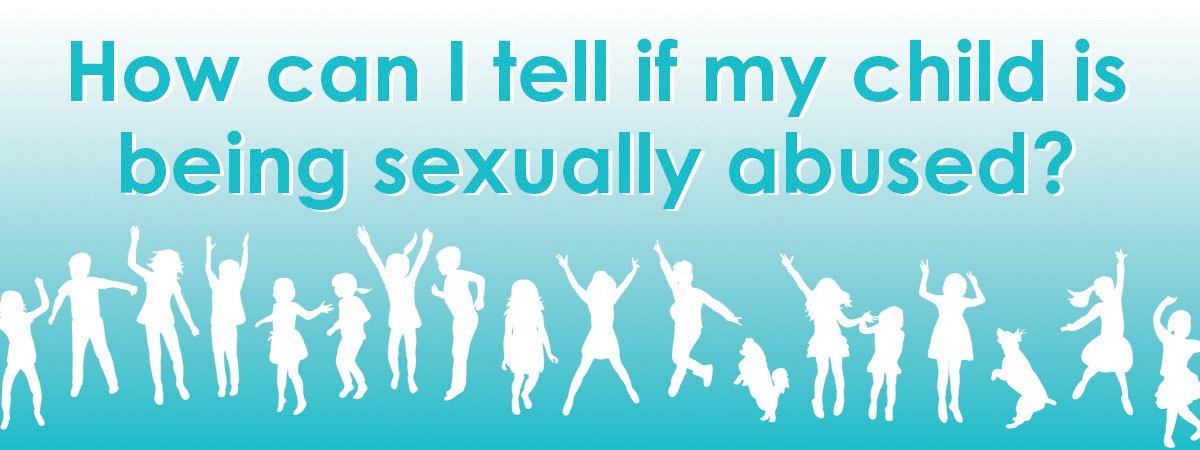

One of the questions we are asked most often is, “How can I tell if my child is being sexually abused?” This question can be one of the hardest to answer because every child presents trauma differently. A child could be exhibiting a broad spectrum of symptoms indicative of abuse or none at all. Furthermore, the behavioral symptoms a child might be exhibiting could also be attributed to other external pressures or trouble at school. One of the best things we can do is to stay aware of any behavioral changes a child might be experiencing and ask questions.
There are very rarely any physical indications that sexual abuse is occurring. What we see are behavioral changes or symptoms – what could be related to sexual abuse or what could be related to something else. Because symptoms of abuse can be difficult to identify, it is important that when we see concerning behaviors, we ask questions and provide a comfortable and safe environment for a child to talk to us.
If one begins noticing any behavior changes, we encourage adults to take more interest in the child and working on deepening their relationship by asking some non-leading questions. Below are some of the main symptoms of abuse we see along with some suggestions on how to begin conversations with children.
New Fears
Children or teens who have experienced abuse may develop new fears of situations, places, or people. They may become excessively shy, anxious, scared or withdrawn. A great way to approach the subject with kids is to say something like, “I know in the past you really enjoyed spending time with ‘so and so’, but lately it seems like you haven’t really wanted to go and visit them. Why is that?” Allow the child an opportunity to share what might be going on.
Anger/Hostility
If children or teens are not allowed or able to express anger toward the abuser, they may take their anger out on others or against themselves. If a child is becoming increasingly angry or hostile, ask what is bothering them and seek professional help if needed. It could just be normal teenage hormones, but we want to reach out to the child in love and focus on why they might be acting that way.
Inappropriate Sexual Behaviors
Children may act out sexually. They may show an unusual interest in other people's or animal's genitals or masturbate excessively. They may try to express affection in an inappropriate way, such as fondling private parts. Teens may participate in risky sexual behavior and make inappropriate advances in public. If you are noticing these behaviors, make a report.
Sleeping and Eating Problems
Children or teens may have problems sleeping, experience nightmares, or display sudden loss or gain in appetite. Children may regress in their development. A child might return to younger, more babyish behavior such as wetting the bed or thumb sucking during naptime.
Problems at School
Children or teens may have difficulty concentrating, which can affect school performance. A change in grades or behavior at school is not uncommon. Most of the time, we see changes that are often mislabeled as “bad” or “difficult,” but it is really a child expressing trauma they have experienced. On the opposite side of the spectrum, we see children who are trying to overachieve. Any time we notice these changes in behavior, we can reach out to the child and touch base.
Loss of Boundaries
Children or teens may be overly friendly and attach easily to strangers or they may tolerate abuse from other children. They may become excessively isolated and withdrawn or may become overly obedient. If we see a loss of boundaries, we approach the child by asking, “I noticed lately you aren’t spending as much time with your friends from school. Would you like to talk about it?” Providing children with an opportunity to talk can sometimes make all of the difference in them disclosing abuse to us.
Self-Destructive Acts
Children or teens may feel such guilt and shame from the abuse that they may take their feelings out by hurting themselves. This may involve hitting or cutting themselves, using drugs and/or alcohol or even attempting suicide. If a child is engaging in self-destructive acts, seek professional help immediately.
Lack of Personal Care or Hygiene
A sudden change in personal care may have many explanations, but if you notice a change, ask questions. It is not uncommon for child abuse victims to exhibit poor hygiene or lack of personal care because they are wanting to seem less attractive in hopes that will keep the abuse from taking place. Likewise, ask questions if a child is suddenly insistent on excessive showering and cleaning, especially if you can see a pattern such as an insistence on personal care each time a child comes home from music lessons. If a child is beginning to dress differently or if they appear to be demonstrating a change in hygiene, you can always say, “Hey, I see that you are dressing in a new style lately. What spurred the change?”
Risk-Taking Behaviors
Children or teenagers who experience abuse may engage in high-risk activities such as using drugs, alcohol or carrying a weapon. If we see that children and teens are partaking in this kind of behavior, we need to reach out with sensitivity and focus on the WHY behind the actions.
Returning to Earlier Behavior
Children who experience abuse may display behaviors shown at earlier ages, such as thumb-sucking, bed-wetting, fear of the dark or strangers. For some children, even loss of acquired language or memory problems may be an issue. Sexual abuse may not be the reason behind why, but it should be considered as a possibility.
Children disclose abuse in their own time, often over time. We cannot rush their disclosure process, but we can pick up on behavior changes and signs we see to do our best to reach out.
About the Author
Carol Logan is the Community Engagement Supervisor who has worked at Alliance For Children for 4 years. She loves working with schools and the community to schedule education. Her passion is prevention education because she knows it can make a difference. In her time outside of the office, she can be found spending time with her husband and newborn son.



